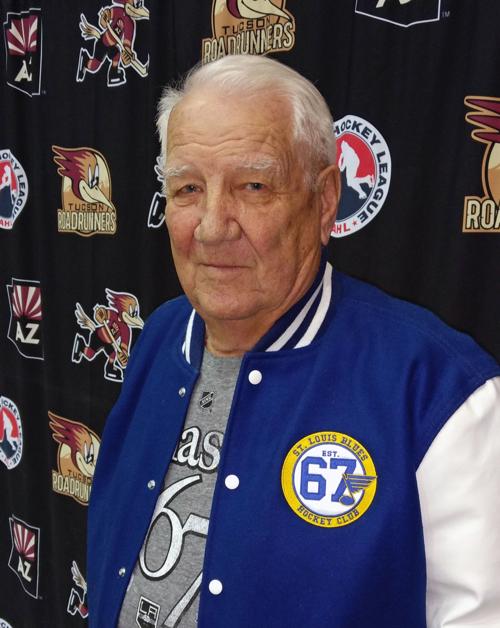Some qualities in the best hockey players have not changed since 1950. Toughness. Determination. The love of the game.
Just ask Tucsonan Fred Hucul, a member of the first NHL St. Louis Blues team of 50 years ago. Ah, but that milestone is just the cherry at the top of his hockey sundae. Let’s back up.
Hucul broke into the six-team NHL in the 1950-51 season as a 19-year-old, fresh out of Moose Jaw and Regina, Saskatchewan, in western Canada. It boggles the mind today to think of the majors with only six teams for all of the U.S. and Canada, and imagine the intense competition for a roster spot with so few jobs available. Getting to the NHL in the pre-expansion era was nothing short of a statistical miracle for a hockey player.
But over the next three seasons the rock-solid (and young) Hucul played 121 NHL games for the Chicago Blackhawks. Then the determined part of his hockey character was especially tested. Chicago told him to spend the next 14 seasons in the minor leagues.
“They owned me. Those days it was just like owning a dog or a horse, and they’d tell you where to go, and what to do, and that’s what we did,” said Hucul, now 85, before a recent Tucson Roadrunners game.
The era before player free agency meant that once a team signed you, they owned your professional rights forever. Often players who had the talent to play in the NHL were stashed in the minor leagues simply to keep them away from the other five major league teams.
“They could take you and move you down to the minors and leave you there,” he said, without a hint of bitterness. That’s just how it was then.
Fred Hucul kept reporting for duty, season after minor league season, because he loved the game. “It was a great time for being in hockey. There were a lot of great guys in the game,” he said.
But there was not a lot of money.
“The major-leaguers today make more playing one game than I did in the 18 years combined that I played,” he added with a smile. “I made $5,000 a season in the Western League. It was only $7,000 in Chicago.”
Hucul survived and thrived in 14 seasons spread out among the Quebec, Western and American minor leagues, owned by the Blackhawks but never getting back to the major league Windy City. Instead, with NHL expansion finally coming in 1967, Hucul’s rights were acquired by the brand-new St. Louis Blues. They needed hockey players with experience to fill their expansion roster.
Fred Hucul was a major leaguer once again.
“I was 35 when I went back to the National League. I have the longest stretch between goals in the league, I think it is 14 years,” he chuckled.
Today, I believe most 21-year-old kids would quit a job after 14 minutes without access to their cellphone. The mental toughness needed to show up and work, day in and out, for 14 years in minor league hockey astonishes me.
“I had a great time in St. Louis, the owners were super to me,” Hucul also remembers, pointing with pride to his new 50-year anniversary Blues jacket. “I had to pack it in that year because of my back, and the next year they called me up and sent me to Kansas City (the Blues’ CHL affiliate) as manager-player-coach. Since I made the player decisions, the first one I made was to retire.”
Hucul has watched several more eras of the game pass since his playing days, and his eyes twinkle when talking of Tucson’s new pro team.
“I really was impressed with the first Roadrunners game that I saw,” he said. “They give a lot of effort, and the crowd was so good, so enthusiastic.”
Watching these new kids claw their way up in the hockey world was like a time machine for him.
“The Roadrunners kids are going through the same that I went through,” he said. “It all depends on those scouts sitting up there each night watching.”
Hucul smiled again, and then expressed gratitude for all the great hockey players, teams, and coaches he worked with. He is excited to see the kids in Tucson work for the same kind of chances.
“One little bump and you’re there, up in the NHL,” he said. “If you’re here in Tucson, you could be on your way.”
If a player today is as tough and dedicated as Hucul, then perhaps they do have what it takes to make it to the majors. Some qualities in the best hockey players have not changed since 1950.





